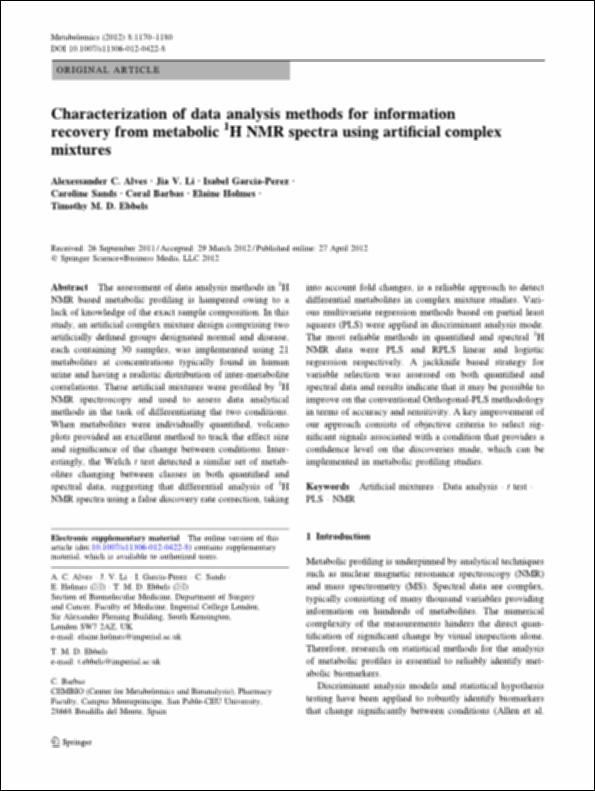Por favor, use este identificador para citar o enlazar este ítem:
http://hdl.handle.net/10637/7658Characterization of Data Analysis Methods for information recovery from metabolic 1H NMR spectra using Artificial Complex Mixtures.
| Título : | Characterization of Data Analysis Methods for information recovery from metabolic 1H NMR spectra using Artificial Complex Mixtures. |
| Autor : | Couto Alves, Alexessander Barbas Arribas, Coral. Li, Jia V. García-Pérez, Isabel Sands, Caroline Holmes, Elaine Ebbels, Tim |
| Materias: | Metabolitos.; Artificial mixtures.; Data analysis.; Test PLS.; NMR. |
| Resumen : | The assessment of data analysis methods in 1 H NMR based metabolic profiling is hampered owing to a lack of knowledge of the exact sample composition. In this study, an artificial complex mixture design comprising two artificially defined groups designated normal and disease, each containing 30 samples, was implemented using 21 metabolites at concentrations typically found in human urine and having a realistic distribution of inter-metabolite correlations. These artificial mixtures were profiled by 1 H NMR spectroscopy and used to assess data analytical methods in the task of differentiating the two conditions. When metabolites were individually quantified, volcano plots provided an excellent method to track the effect size and significance of the change between conditions. Interestingly, the Welch t test detected a similar set of metabolites changing between classes in both quantified and spectral data, suggesting that differential analysis of 1 H NMR spectra using a false discovery rate correction, taking into account fold changes, is a reliable approach to detect differential metabolites in complex mixture studies. Various multivariate regression methods based on partial least squares (PLS) were applied in discriminant analysis mode. The most reliable methods in quantified and spectral 1 H NMR data were PLS and RPLS linear and logistic regression respectively. A jackknife based strategy for variable selection was assessed on both quantified and spectral data and results indicate that it may be possible to improve on the conventional Orthogonal-PLS methodology in terms of accuracy and sensitivity. A key improvement of our approach consists of objective criteria to select significant signals associated with a condition that provides a confidence level on the discoveries made, which can be implemented in metabolic profiling studies. |
| Descripción : | En: Metabolomics. ESSN. 2153-0769. v. 8, n. 1 (2012) : 1-11 |
| URI : | http://hdl.handle.net/10637/7658 |
| Derechos: | http://creativecommons.org/licenses/by-nc-nd/4.0/deed.es |
| Fecha de publicación : | 16-sep-2012 |
| Centro : | Universidad San Pablo-CEU |
| Aparece en las colecciones: | Facultad de Farmacia |
Los ítems de DSpace están protegidos por copyright, con todos los derechos reservados, a menos que se indique lo contrario.


